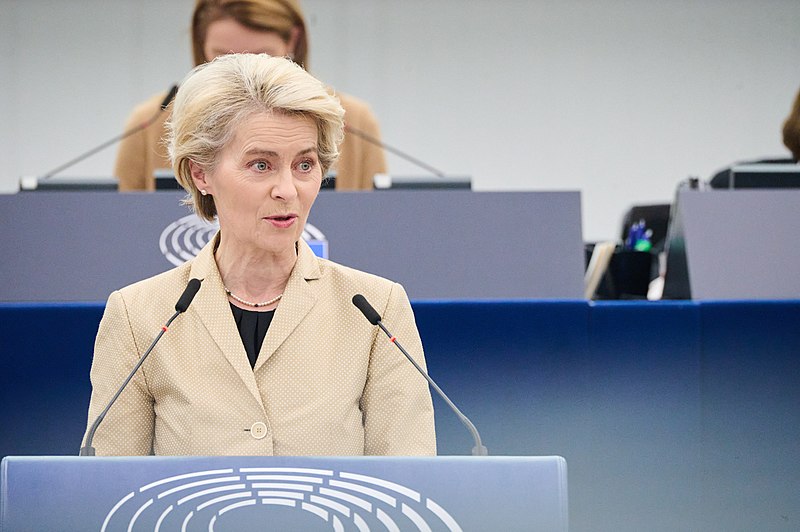Croatia has entered the new year as the 27th country to enter the European Union’s Schengen zone. Croatia has also switched to the euro currency, leaving its kuna currency as it enters the largest passport-free zone in the world.
During the new year, on Sunday, the Balkan nation switched its currency to the euro and became the 20th member of the eurozone and the 27th country to enter the Schengen zone, the largest passport-free travel area.
EU commission chief Ursula von der Leyen visited Croatia to mark the milestone for the country since it applied to join the EU nearly 10 years ago. Von der Leyen met with Croatian Prime Minister Andrej Plenkovic and Slovenian President Natasa Pirc Musar at the border crossing between Croatia and EU member Slovenia.
“It is the season of new beginnings. And there is no place in Europe where this is more true than here in Croatia,” tweeted von der Leyen.
Experts have said that Croatia’s adoption of the euro currency will help protect the country’s economy at a time when inflation has skyrocketed due to Russia’s invasion of Ukraine, resulting in rising food and fuel prices. Experts have also said that adopting the euro will lower borrowing conditions and economic hardships. Croatia’s inflation rate went up to 13.5 percent compared to the eurozone’s 10 percent back in November.
Among the Croatian public, the reaction to adopting the euro is mixed, as it raised fears that the cost of living may rise as businesses may round up prices when converted.
Last month, Moldovan President Maia Sandu expressed her hopes on Thursday that the country may join the European Union within the decade. The bloc accepted Moldova as a membership candidate back in June, along with Ukraine, marking a diplomatic feat for Sandu, who was elected in 2020 on a pro-European and anti-corruption platform.
“My wishes are very ambitious,” said Sandu in televised remarks. “I think we must become a member of the European Union by the end of this decade.”
While entry into the bloc is a long and complex process, Moldovan economy minister Dumitru Alaiba told Reuters that he was drafting long-term reforms and would cut bureaucracy in order to establish foundations of a business-friendly economy to fast-track the country’s entry into the EU.



 India–U.S. Interim Trade Pact Cuts Auto Tariffs but Leaves Tesla Out
India–U.S. Interim Trade Pact Cuts Auto Tariffs but Leaves Tesla Out  Nicaragua Ends Visa-Free Entry for Cubans, Disrupting Key Migration Route to the U.S.
Nicaragua Ends Visa-Free Entry for Cubans, Disrupting Key Migration Route to the U.S.  Trump Congratulates Japan’s First Female Prime Minister Sanae Takaichi After Historic Election Victory
Trump Congratulates Japan’s First Female Prime Minister Sanae Takaichi After Historic Election Victory  Trump Signs Executive Order Threatening 25% Tariffs on Countries Trading With Iran
Trump Signs Executive Order Threatening 25% Tariffs on Countries Trading With Iran  Federal Judge Restores Funding for Gateway Rail Tunnel Project
Federal Judge Restores Funding for Gateway Rail Tunnel Project  China Warns US Arms Sales to Taiwan Could Disrupt Trump’s Planned Visit
China Warns US Arms Sales to Taiwan Could Disrupt Trump’s Planned Visit  New York Legalizes Medical Aid in Dying for Terminally Ill Patients
New York Legalizes Medical Aid in Dying for Terminally Ill Patients  Bangladesh Election 2026: A Turning Point After Years of Political Suppression
Bangladesh Election 2026: A Turning Point After Years of Political Suppression  Antonio José Seguro Poised for Landslide Win in Portugal Presidential Runoff
Antonio José Seguro Poised for Landslide Win in Portugal Presidential Runoff  Trump Lifts 25% Tariff on Indian Goods in Strategic U.S.–India Trade and Energy Deal
Trump Lifts 25% Tariff on Indian Goods in Strategic U.S.–India Trade and Energy Deal  Trump’s Inflation Claims Clash With Voters’ Cost-of-Living Reality
Trump’s Inflation Claims Clash With Voters’ Cost-of-Living Reality  Anutin’s Bhumjaithai Party Wins Thai Election, Signals Shift Toward Political Stability
Anutin’s Bhumjaithai Party Wins Thai Election, Signals Shift Toward Political Stability  Taiwan Says Moving 40% of Semiconductor Production to the U.S. Is Impossible
Taiwan Says Moving 40% of Semiconductor Production to the U.S. Is Impossible  Trump Backs Nexstar–Tegna Merger Amid Shifting U.S. Media Landscape
Trump Backs Nexstar–Tegna Merger Amid Shifting U.S. Media Landscape  Ghislaine Maxwell to Invoke Fifth Amendment at House Oversight Committee Deposition
Ghislaine Maxwell to Invoke Fifth Amendment at House Oversight Committee Deposition  Japan’s Prime Minister Sanae Takaichi Secures Historic Election Win, Shaking Markets and Regional Politics
Japan’s Prime Minister Sanae Takaichi Secures Historic Election Win, Shaking Markets and Regional Politics  Ohio Man Indicted for Alleged Threat Against Vice President JD Vance, Faces Additional Federal Charges
Ohio Man Indicted for Alleged Threat Against Vice President JD Vance, Faces Additional Federal Charges 































